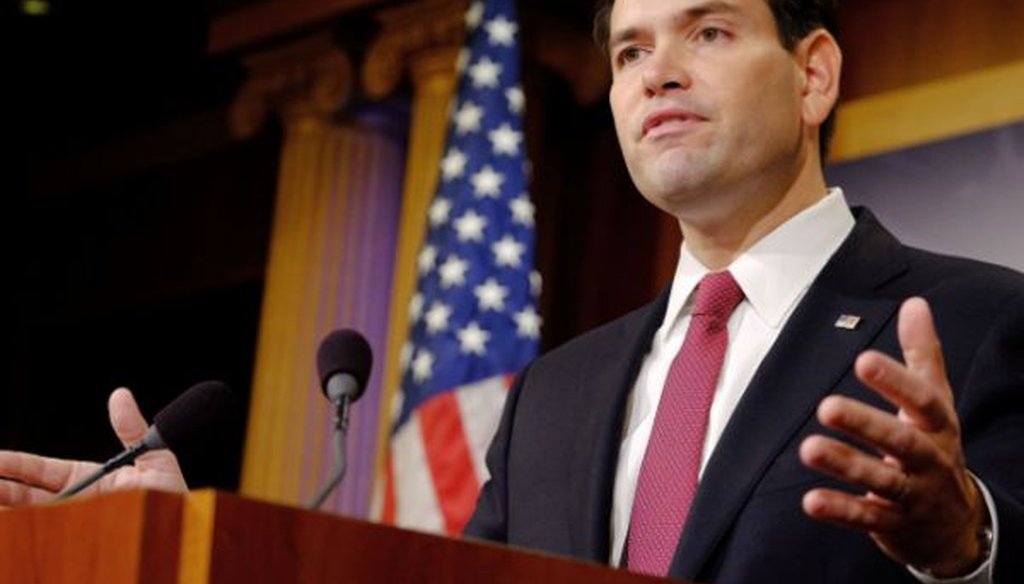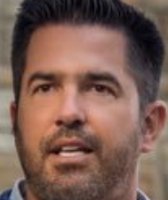Stand up for the facts!
Our only agenda is to publish the truth so you can be an informed participant in democracy.
We need your help.
I would like to contribute

Sen. Marco Rubio, R-Fla., reacts to President Barack Obama's announcement about revising policies on U.S.-Cuba relations on Dec. 17, 2014.
The torrent of many of the distortions and half-truths in the state’s top election battles this year had roots in South Florida.
In 2014, Miami-Dade was home to both of Gov. Rick Scott’s and Democrat Charlie Crist’s running mates, the scene of a closely-watched Congressional battle and ground zero for national conversations about climate change and Cuba.
Looking ahead to the 2016 presidential contest, two potential GOP contenders call Miami-Dade home: former Gov. Jeb Bush and U.S. Sen. Marco Rubio.
And that left-leaning county to the north, Broward County, is home to one of the top critics of the GOP: DNC chair U.S. Rep. Debbie Wasserman Schultz.
Here’s a look back at some of our South Florida fact-checks in 2014.
Claims by Bush and Rubio
Bush, who announced on Facebook on Dec. 16 that he is "actively" exploring running for president, is known for his push to improve education standards. We have fact-checked many of his claims about how schools fail to prepare high school students for college, work and the military.
Bush said in a speech that the Orange County, Fla. school board "voted to make it impossible for a student to receive a grade below 50." That vote means that 50 is the minimum number for quarter and semester grades, though it’s still possible to get a lower grade on an individual assignment or test. We rated the claim Mostly True.
After Rubio’s Senate immigration bill in 2013 failed to get a vote in the House, this year he turned his attention to other topics including Obamacare and climate change.
In May, as scientists released new reports warning about climate change, Rubio said human activity is not "causing these dramatic changes to our climate."
A report analyzing all scientific papers that address the causes of climate change showed 97.1 percent of findings that took a position agree that there’s been a negative human impact on the atmosphere. We rated his claim False.
Rubio, the son of Cuban immigrants, became a leading GOP voice against Obama’s Dec. 17 announcement about normalizing relations with Cuba.
Rubio said that in the negotiations, "no commitment was made to allowing the establishment of political parties or to even begin the semblance of a transition to a democracy," in Cuba.
He was largely correct. Cuba did promise to release 53 political prisoners, take steps to open up the Internet and allow greater scrutiny by international organizations. But it led to no breakthroughs in structural reform to a political system. We rated this statement Mostly True.
Claims in the governor’s race
As Scott and Crist battled for the Hispanic vote they made claims about immigration, including about in-state tuition and driver’s licenses for Dreamers. We gave Scott a Full Flop for opposing in-state tuition for Dreamers before he came around to supporting it. We gave Crist a Full Flop after he came out in support of dropping the embargo this year after supporting it while governor.
The Miami-Dade chapter of the Democratic Hispanic caucus of Florida tried to link Scott’s running mate Lt. Gov. Carlos Lopez-Cantera to a controversial Arizona immigration law.
The group said that in 2011 Lopez-Cantera, the former House majority leader from Miami-Dade "staunchly supported HB 7089, the anti-immigrant bill modeled after the racial profiling Arizona law, which Rick Scott embraced during his first governor's race."
Lopez-Cantera never had to take a vote on the bill, which died that session. While he made positive statements early on about the measure, as protesters turned up the heat he opposed it. We rated this claim Mostly False.
South Florida’s congressional delegation
Miami-Dade school board member Carlos Curbelo, a Republican, ousted Democrat U.S. Rep. Joe Garcia, D-Miami, in a swing district that spans Westchester to Key West. They attacked each other on hot topics in the district: flood insurance and Medicare.
Garcia said in an ad that "Curbelo supported raising flood insurance rates." But Curbelo hadn’t taken a vote on flood insurance. Though he supports efforts to make it easier for private companies to enter the market in hopes that will spark competition, that is not proof that he favors raising rates. We rated that statement False.
Curbelo was recorded by a tracker saying Medicare and Social Security are Ponzi schemes. While both programs face the challenge of fewer workers paying for all the benefits of current retirees, they are not criminal schemes. We rated that claim False.
While Garcia lost his seat, the rest of South Florida’s congressional delegation was easily re-elected, including Wasserman Schultz. As DNC chair, Wasserman Schultz continued to defend Obamacare, spoke up for women’s rights and voting rights.
Following federal court cases about health care, she said in July: "There were 36 states where Republicans who were in charge refused to implement a state exchange, and as a result people who get Affordable Care Act plans are getting them through the federal exchange."
As of July, there were 36 states that use the federal exchange or state-federal partnerships instead of state-based marketplaces. But seven of those states are run by Democrats. And, some of the states with Republican governors, like New Mexico and Idaho, tried to institute a state exchange before opting for federally-facilitated marketplace. We rated this statement Mostly False.
(A final note in the governor’s race: in the primary Crist easily beat Sen. Nan Rich of Weston.)
Claims about Broward County
Fort Lauderdale drew international attention for the arrests of Arnold Abbott, a 90-year-old, who was nabbed for allegedly violating the city’s laws that attempt to curb outdoor feedings of the homeless.
Mayor Jack Seiler said that "Contrary to what was reported in the media, no one was taken into custody."
Seiler was correct that Abbott wasn’t taken into custody -- the activist was not handcuffed or taken to jail but was instead given a notice to appear in court. But his carefully worded claim glosses over the fact that Abbott was indeed arrested on more than one occasion, something that leaves Abbott at least theoretically in peril of being sentenced to jail. We rated this claim Mostly True.
During a speech in March, County Mayor Barbara Sharief touted the county’s recent economic success.
"Our unemployment rate is at 5.3 percent, the lowest in Florida, and it has remained that way for more than a year now," Sharief said in March.
At the time, Broward had the lowest unemployment in Florida among large urban counties -- but not the lowest in the state. We rated her claim Mostly False.
Our Sources
Sun-Sentinel, "Outdoor homeless feedings can continue through the holidays, Fort Lauderdale says," Dec. 22, 2014
See individual fact-checks for additional sources








































